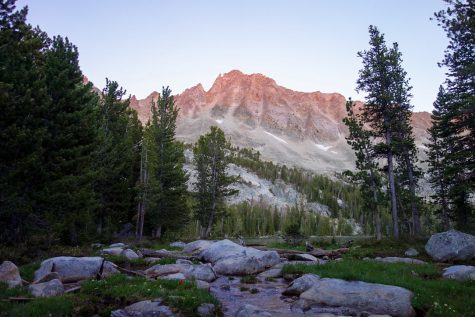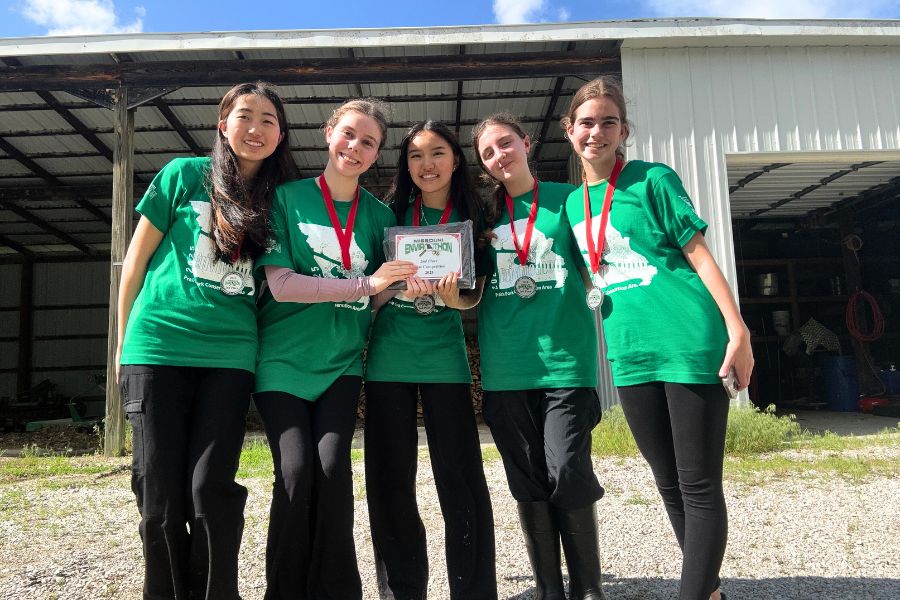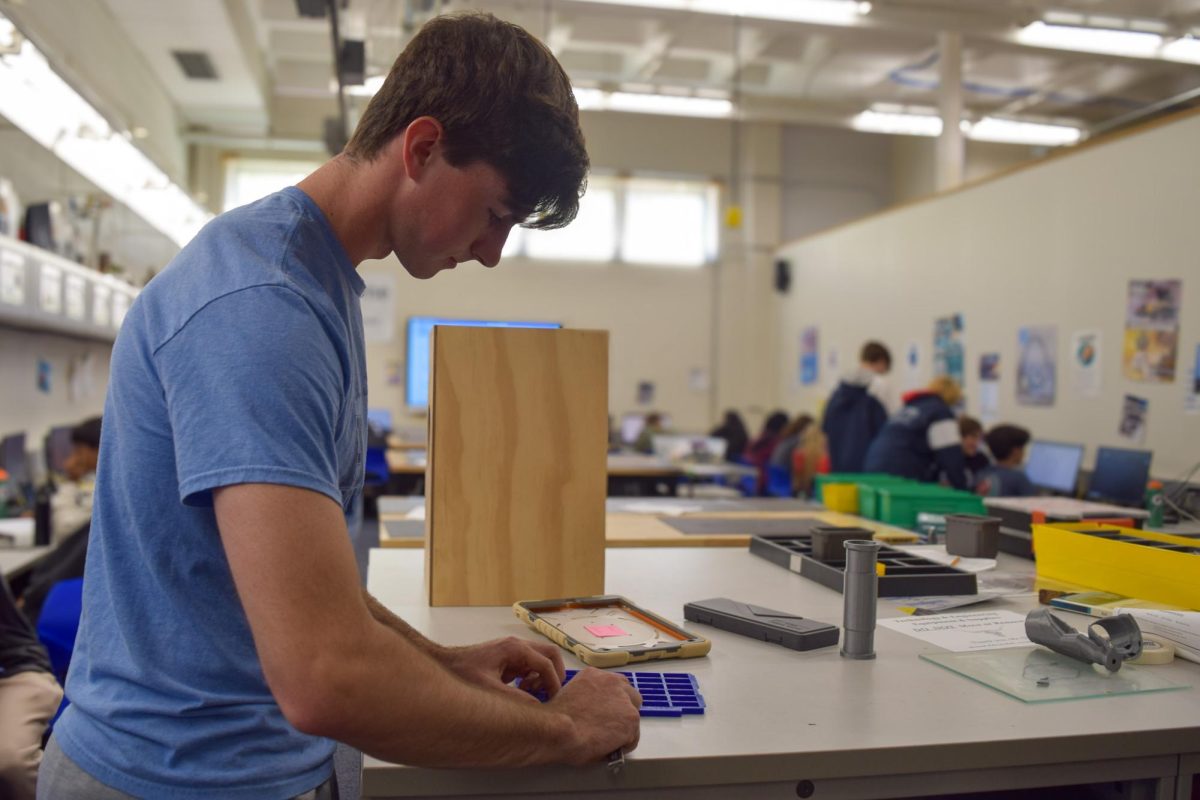In early May, junior Lexi Lutz interviewed to be a part of a program for the Montana Wilderness School, a non-profit organization based in Bozeman, Mont. that provides wilderness education for teenagers. Lutz was selected to go on a high-level backpacking expedition that lasted for 18 days and consisted of never-ending camping, hiking, summiting and ice-climbing.
Six months before the trip, Lutz received instructions from the wilderness school detailing practice hikes to practice carrying heavy equipment while hiking. She also did intensive weight training at the gym to help prepare. Lutz went on the trip alone, catching a three-hour flight to Bozeman on June 14. A course member picked Lutz up in Bozeman, and she stayed in the school’s home base cabin for the first night. She met her two instructors and three trip members there, and the group set off the next day for an intense wilderness expedition.
“I was really nervous going to a place I had never been with people I didn’t know. I had no idea what was really [lying ahead]. I knew it was going to be a huge challenge, but that was why I came on the trip. I wanted to find myself and [grow] by pushing myself out of my comfort zone,” Lutz said.
Lutz carried all of her camping, summiting and hiking gear in her backpack, and she needed a team member’s help to put it on as the backpack amounted to 60 pounds when it was fully equipped. Lutz carried all of her personal gear and belongings, however common items that the entire group used were divided among the team members. Some of her gear included climbing equipment and even an ice axe.
“It was super hard to carry a 60-pound backpack. It was the hardest thing I have ever done in my life. It was not just physically tiring, but mentally tiring. I wanted to turn around, to stop, to go back. I feel like I didn’t have any time for my body to recover. Every day got easier though. I was gliding by the end; I didn’t even feel the weight on my back,” Lutz said. “I was in some of the best shape of my life after that trip and I just felt really strong. I wasn’t even thinking about how much faster I was moving.”
Summiting, or climbing to a mountain’s highest peak, was a common activity during the expedition. Normally, the group would set up camp at the mountain’s base, pack the necessary gear and other materials in their backpack and set off with a large jug of water. While not a probability, the instructors always came prepared with the safety equipment necessary for fatal accidents. Despite the high risks, Lutz was not concerned at all by the possibility of an accident.
“In case a big rock fell on someone’s leg, we would wrap it in a sleeping pad. We [also] brought a sleeping bag for warmth in case we got stranded,” Lutz said. “I wasn’t actually worried something like that would happen, not at all. I’m very brave; I never think anything bad is going to happen, which can be bad sometimes. But we all knew what we were doing, and we were staying safe.”
Lutz and her team set off at dawn to reduce the possibility of getting caught in a storm. The weather at the summits typically rolled in around noon, and the team would get up at 4 a.m. to avoid any bad weather.

“If you’re at the peak when the storm hits, you will die. You will just blow off the mountain. We were prepared by just waking up really early and being on our way down by the time the clouds came in the morning,” Lutz said.
Although no one got hurt while summiting or hiking, there were some things that went wrong during the trip. The team used an electric bear fence to protect their food from unruly animals, which stopped working once during the night. There was no bear attack, but a marmot did get into the food and eat all of the team’s hot sauce. Towards the last few days of the trip, the team also did not ration correctly and had to go without food during the day until the expedition ended.
“We had this hike that was nine miles, which mountain miles are longer with going uphill with full packs. We had to go the entire day without any food. All we had was a handful of trail mix and half a bag of dried apple rings, which were rationed for two people. We split it between all of us,” Lutz said. “Our instructors had their own rations, and my instructor gave me one dried apricot. I was grateful because I didn’t want to take their food, but I was kind of upset too. I felt like I had no energy to go off of and I felt extremely weak and tired. As the day went on, my feet were dragging because I was moving so slowly. The hike felt like it went on forever and I just wanted to finish.”
Although it would be hard for anyone to go without food for a day, Lutz and her team were fighting calorie deficiency. With hiking or summiting every day, setting up and breaking down camps and learning about survival, Lutz was burning more calories than what was strictly healthy.
“We ate M&M’s for lunch one day because we didn’t have any meals left. It was four days like that, [with little food]. The last day was when we made it back, and they had a big dinner for us waiting,” Lutz said. “I had thought about the dinner for four days, [about] how good it was going to be. That was the first time I ate meat in 18 days, and it tasted like the best thing I’d ever had.”
With still several days left to go and no energy left, Lutz was rapidly losing motivation for finishing the expedition. The three other people on Lutz’s team helped her get through the challenging moments by reminding her why she came. While she is now only in touch with one of them, Lutz appreciates the memories she got to make with her team members.
“[My teammates] told me, ‘you wanted to push yourself, to grow from this. We are going to take this to our advantage and learn from this experience and finish it out. That’s what we came here to do and that’s all we can do because we’re stuck in the middle of the woods. We can’t go anywhere,’” Lutz said. “The people on my trip were really kind, and they taught me so many things. They all came from different places, [including Milwaukee and Canada], and they taught me how to be self-aware, communicate and work together. We laid out one night in our sleeping bags under the stars, and the whole entire sky was lit up. It was so clear because there was no [light] pollution and it was really beautiful.”
The 18-day expedition posed many physical and mental challenges, but Lutz believes that overcoming those challenges allowed her to grow and better herself. Lutz says the trip also helped her realize her capabilities.
“One of the main things I learned is not to take my stress out on other people. I would yell at everybody and I realized that it totally put the group mood down. So I learned to keep my stress to myself so I don’t stress everyone else out too,” Lutz said. “I’m always going to remember how big of an accomplishment this trip was to me, because I didn’t think I could do it or make it to the end. I did make it to the end, but it was a really big challenge.”
According to Lutz, the expedition completely altered her perspective on her life. She felt much more grateful than before for the things in her home, such as a bed or a shower.
“Food tasted amazing when I got home. I didn’t look at my phone for two weeks. I was totally positive and loving of everything that I saw when I got back. I spent time with myself and understood myself,” Lutz said. “I felt completely reborn, and I had so much love in my heart for myself when I came back home. [The trip is] something I’m never going to forget.”


![After waking up at 4 a.m. and summiting the first mountain of the day, junior Lexi Lutz (third from the left) pauses to take a victory picture with her team at the peak. To get to this point, Lutz traveled through miles of technical terrain along a steep slope with eroded and loose rocks. “We summited three peaks that day and rested in between the peaks, because it shielded us from bad weather,” Lutz said. “The first peak was great, and it was a beautiful view; I was hardly tired. [Throughout the day], we traveled across so much land and my legs felt stiff and tired. The walking felt endless but I felt really accomplished and connected to nature when I got back down.”](https://pwestpathfinder.com/wp-content/uploads/2021/10/20210624_-900x675.jpg)
![Focused on providing exceptional service, sophomore Darsh Mahapatra carefully cleans the door of a customer’s car. Mahapatra has always believed his customers deserve nothing less than the best. “[If] they’re trusting us with their car and our service, then I am convinced that they deserve our 100 percent effort and beyond,” Mahapatra said.](https://pwestpathfinder.com/wp-content/uploads/2025/10/DSC_0018-1200x800.jpg)
![Sophomore Aleix Pi de Cabanyes Navarro (left) finishes up a soccer game while junior Ava Muench (right) warms up for cross country practice. The two came to Parkway West High School as exchange students for the 2025-2026 school year. “The goal for the [exchange] program is to provide opportunities for both Parkway students and our international exchange students to learn about other cultures, build connections and become confident, capable, curious and caring — Parkway’s Four C’s — in the process,” Exchange Program Lead Lauren Farrelly said.](https://pwestpathfinder.com/wp-content/uploads/2025/10/Feature-Photo-1200x800.png)

![Gazing across the stage, sophomore Alexis Monteleone performs in the school theater. The Monteleone family’s band “Monte and the Machine” has been releasing music since 2012, but Alexis started her own solo career in 2024 with the release of her first single, Crying Skies. “My whole family is very musical, [and I especially] love writing [songs with them],” Monteleone said.](https://pwestpathfinder.com/wp-content/uploads/2025/09/DSC7463-1200x798.jpg)
![Amid teaching a lesson to her AP Calculus BC class, Kristin Judd jokes alongside her students in their funny remarks. Judd has always enjoyed keeping the mood light in her classroom, along with on the volleyball court. “[I enjoy] that side talk where you see [or] overhear a conversation and chime in, or somebody says something funny,” Judd said.](https://pwestpathfinder.com/wp-content/uploads/2025/09/image-1200x730.jpg)
![Eyeing the ball, junior Ella McNeal poses for her commitment pictures at Clemson University. McNeal’s commitment comes after months of contact with top Division 1 soccer programs. “ It has taken a lot to get to where I am, but I know that [what] I've already been through is just the beginning, and I can't wait for what is to come,” McNeal said.](https://pwestpathfinder.com/wp-content/uploads/2025/09/IMG_4926-1200x900.jpeg)


![Senior Adam Zerega stands with senior Dexter Brooks by farm equipment. Zerega often worked with friends and family on his farm. “I've been able to go to my family's farm since I was born. I [spend] at least three weekends a month [on the farm], so I'm there all the time,” Zerega said.](https://pwestpathfinder.com/wp-content/uploads/2025/04/IMG_4872-1200x900.jpg)

![After a thrilling point, senior Katie Byergo and junior Elle Lanferseick high-five each other on Oct. 8. With teamwork and camaraderie, Byergo worked together in the game against Lafayette High School. “[Byergo’s] is really positive with a good spirit,” Lanferseick said. “I set her [the ball] and she hits it [or] gets the kill.”](https://pwestpathfinder.com/wp-content/uploads/2025/10/DSC_9349-1-e1761159125735-1200x791.jpg)
![Leaning on the podium, superintendent Melissa Schneider speaks to Parkway journalism students during a press conference. Schneider joined Parkway in July after working in the Thompson School District in Colorado. “My plan [to bond with students] is to get things on my calendar as much as possible. For example, being in [classes] is very special to me. I am trying to be opportunistic [meeting] kids [and] being in [the school] buildings. I have all the sports schedules and the fine arts schedules on my calendar, so that when I'm available, I can get to them,” Schneider said.](https://pwestpathfinder.com/wp-content/uploads/2025/09/IMG_5425-1200x943.jpeg)

![Leaping through the air, senior Tyler Watts celebrates his first goal of the season, which put the Longhorns up 1-0 against the Lafayette Lancers. Watts decided to play soccer for West for his last year of high school and secured a spot on the varsity roster. “[Playing soccer for West] is something I had always dreamed of, but hadn’t really had a good opportunity to do until now. It’s [really] fun being out [on the field], and I’m glad I decided to join the team. It’s just all about having fun with the boys and enjoying what time we have left together,” Watts said.](https://pwestpathfinder.com/wp-content/uploads/2025/09/DSC_1951-1200x855.jpg)

![Shifting global trade, President Donald Trump’s tariffs are raising concerns about economic stability for the U.S. and other countries alike. “[The tariffs are] going to pose a distinct challenge to the U.S. economy and a challenge to the global economy on the whole because it's going to greatly upset who trades with who and where resources and products are going to come from,” social studies teacher Melvin Trotier said.](https://pwestpathfinder.com/wp-content/uploads/2025/05/MDB_3456-1200x800.jpg)

![Pitching the ball on Apr. 14, senior Henry Wild and his team play against Belleville East. Wild was named scholar athlete of the year by St. Louis Post-Dispatch after maintaining a high cumulative GPA and staying involved with athletics for all of high school. “It’s an amazing honor. I feel very blessed to have the opportunity to represent my school [and] what [it] stands for,” Wild said.](https://pwestpathfinder.com/wp-content/uploads/2025/05/unnamed-6-1200x714.jpg)
![Red, white and blue, the American flag holds the values of our democracy. The fight that we once endured has returned, as student journalists and senior correspondents across the country are losing their voices due to government control. “[Are] the White House and [the] government limiting free speech [and] freedom of the press? Yes [they are],” chief communications officer of the Parkway School District and former journalist Elisa Tomich said.](https://pwestpathfinder.com/wp-content/uploads/2025/03/Untitled-design-14.jpg)
![Freezing in their position, the Addams Family cast hits the “rigor mortis” pose after cast member and senior Jack Mullen, in character as Gomez Addams, calls out the stiff death move. For the past four months, the combined company of cast members, orchestra pit, crew and directors all worked to create the familial chemistry of the show. “I’m excited for [the audience] to see the numbers, the music, the scenes, but I also just love all the technical aspects of it. The whole spectacle, the costumes, makeup and the people that put in the work backstage in order to make the show successful on stage. I’m excited for people to see and appreciate that,” Mullen said.](https://pwestpathfinder.com/wp-content/uploads/2025/03/DSC0116-1200x800.jpg)
